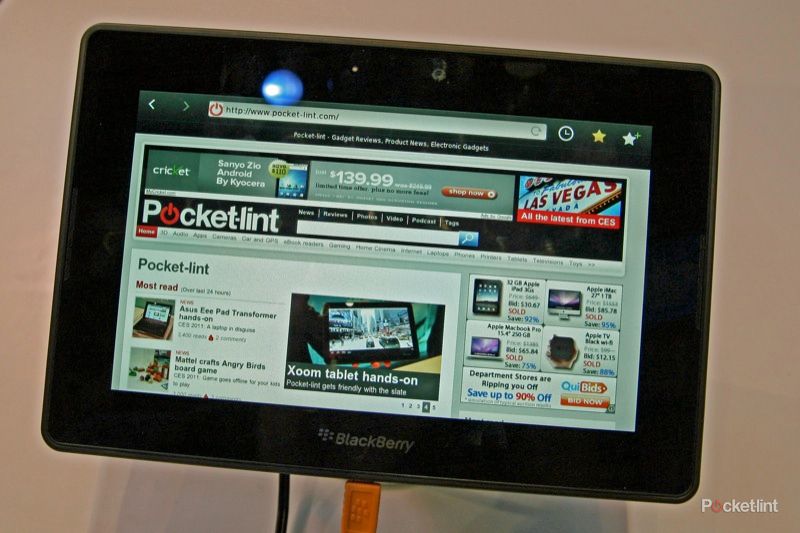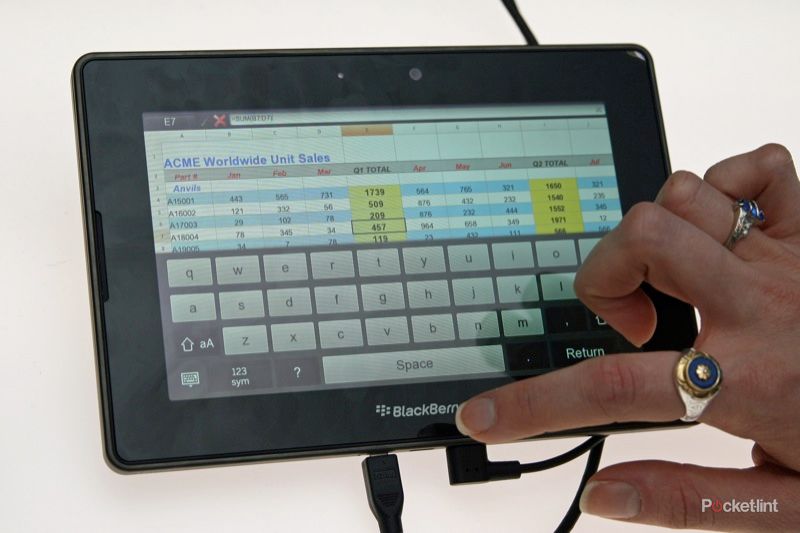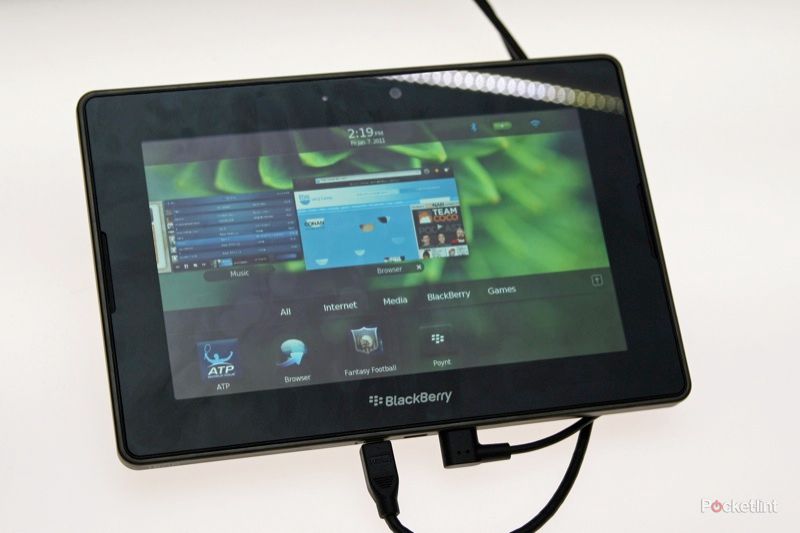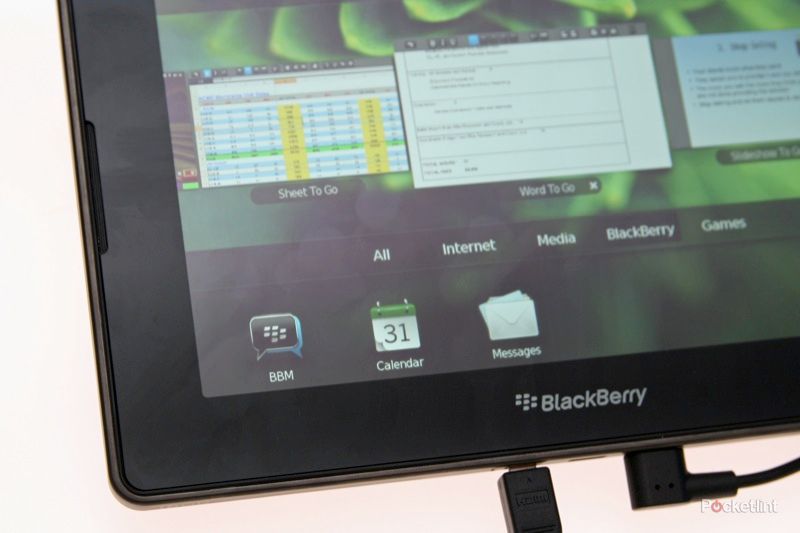We’ve seen the PlayBook on several occasions now. We saw it when announced, we’ve had it demoed, we’ve played with it ourselves, we’ve been through the mill with all the briefings and showcases, we’ve seen videos and read all the gossip. But we’ve been holding off setting out our stall on the PlayBook until we’d seen enough to really put it into place.
Our quick take
There has been a lot of talk about battery life, which for some people has become a prime concern. RIM continue to report that the device isn’t finalised and operational battery life hasn’t been determined yet. We’re not going to slam RIM for this, but we’d like to see them get on and release the PlayBook as it’s already had a relatively long lead time.
From what we’ve seen so far, and having now actually used the PlayBook, we can see that it will appeal to BlackBerry users, but the slightly quirky approach that the PlayBook takes to connectivity and functions will deter those looking for a complete feature set.
When we get the PlayBook in for a review we’ll be able to determine whether its status as a bridged device brings any advantage over a rival device that offers the complete package, or whether you'll find yourself opting for an iPad or Android tablet instead.
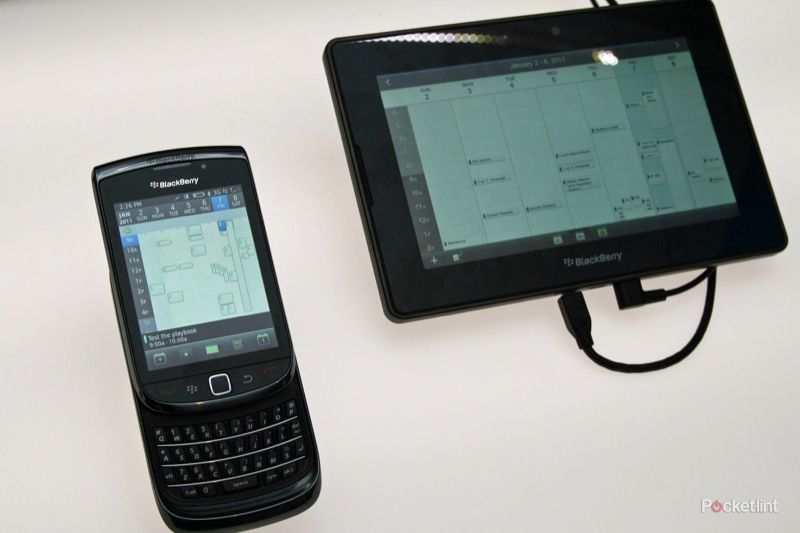
First Look
| FOR | AGAINST |
|---|---|
|
|
One thing is clear, and that is that RIM is being guarded about the PlayBook. Prising the PlayBook out of the hands of a RIM agent is quite a challenge. Even set out for public display, the PlayBook seems to have a minder that will wade in to help you, or guide you, or perhaps just stop you from getting too frisky with it.
Starting with the design, the 7-inch playbook doesn’t really differentiate itself from many of the other devices out there. It’s black, it’s skinny, it’s uncluttered and feels solid enough in the hand. There are connections across the bottom, cameras front and back. It measures 130 x 193 x 10mm and weighs just 400g. The screen offers a resolution of 1024 x 600 and the whole thing is powered by a dual core OMAP 4430 1GHz processor and backed by 1GHz RAM. But the really cool thing about the design is how RIM has put the screen bezel to practical use.
Thinking outside the screen, the bezel gives you various options that would otherwise require on-screen buttons. Using the PlayBook has a “gestures” feeling to it, so swiping the screen and bezel in a particular way results in a particular action. The nice thing is that you can swipe up the keyboard from the bottom left-hand corner diagonally, you can jump back to the menu by swiping up from the bottom (right over the BlackBerry logo) and you can scroll across open apps by swiping across the whole screen.
The gestures seem deliberate enough to make sure it knows the difference between you wanting to switch apps or scroll around a page; learning to operate the PlayBook took us all of 2 minutes. The response is exceptionally good, it has a nice slick feel as you cruise around the device and we didn't see any sign of lag or delays, but then we wouldn't expect to when the device is being publicly showcased.
The best way to understand the multitasking on the PlayBook is to look at how it is handled by webOS on Palm devices. In the same way as you can on those mobile devices, there is a central task manager view with thumbnails of your running apps, which you can close and open programme by swiping the “card” off the top of the screen, effectively throwing it away. We were also impressed at how well the PlayBook handled running multiple tasks at the same time. Of course, this was very closely controlled and we don’t really know what will happen when the PlayBook meets the real world - something we’d have to look at when the PlayBook gets closer to launch and we get ourselves a retail review sample.
The menu systems are instantly familiar if you are a BlackBerry 6 user - the menus will pull up from the bottom, and let you tab through the various sections: all, internet, media, games. We can’t help thinking that the choice of menu tabs is indicative of how RIM wants you to perceive the PlayBook - it’s not all business, but it’s all about jollity and entertainment. A smart move? It certainly assuages the hang-ups you might have about the lack of multimedia performance on your BlackBerry Torch or Bold.
And this is why we think the BlackBerry PlayBook is a pretty smart device. It gives you those multimedia japes that other platforms take for granted. You can still have your BlackBerry handset - the Alpha and Omega of push email and hardware keyboards - and the PlayBook for when you want to kick back and do something else. Sure, a more talented handset like the iPhone 4 or Google Nexus S gives you a more convenient mobile internet platform, but taking its position as the third screen, the PlayBook’s seamless and secure bridging to your BlackBerry means it fits the role nicely.
It isn’t really fair to put the PlayBook alongside the Apple iPad and ask which you’d choose, and we don’t think that the PlayBook will have the appeal of the iPad for non-BlackBerry users. But we do think that mobile workers who want to continue with their BlackBerry phone will instantly appreciate what the PlayBook can do. Although we’ve talked about overt highlighting of entertainment through the menus, it is things like the syncing of the calendar or the ability to open up documents and edit them that really appeals. Some of the business potential is really compelling.
So this is how the scenario plays out. You get an email on your handset with a Word document attached. You preview it and find it has been written by a ham-fisted buffoon who lacks any grasp of basic English composition. So you open it up on the PlayBook to take advantage of the 7-inch display and on-screen keyboard, add the touch of class that it needs and then send it on. We accept that you could do this with any other tablet device by simply picking up your emails on it, but having played with Word To Go (and Sheet To Go) on the PlayBook the business application became more obvious.
We had the chance to play with a bridged device too, the PlayBook connected via secure Bluetooth to a BlackBerry Torch. When bridged, a "BlackBerry" tab appears in menu, offering access to services on the handheld device. RIM were keen to push the term "bridging" over "tethering" as essentially you're partnering the device rather than just borrowing the data connection. We tried some calendar updates to find that they instantly updated in the PlayBook. The calendar is another good example of how this bridged partnership works. The PlayBook won't run off and sync with your cloud calendar services, but will pick up anything from your BlackBerry handset. In this scenario you could be syncing wirelessly with Exchange or Google calendars and you'll then have complete access on both devices. Effectively it means you only need to sync once, which does have some advantages when it comes to conflict avoidance.
Returning to entertainment, we saw the PlayBook playing back HD video and outputting it via HDMI on a larger screen. It will play a variety of video content including Flash and HTML5 and it looked excellent. We like the inclusion of a conventional output so you can use it easily with a larger screen and we suspect that some will use it this way for presentations. There are two forward facing speakers at the edges controlled by the volume rocker on the top, although there is an on-screen volume control too that seemed easier to use.
Browsing was relatively quick, although the busy showfloor Wi-Fi connection isn’t the best way to judge this, but pages did seem to load fairly quickly. As the PlayBook is fully Flash compliant, like the latest run of Android tablets, you get a more complete internet experience.
To recap
From what we’ve seen so far, and having now actually used the PlayBook, we can see that it will appeal to BlackBerry users, but the slightly quirky approach that the PlayBook takes to connectivity and functions will deter those looking for a complete feature set

